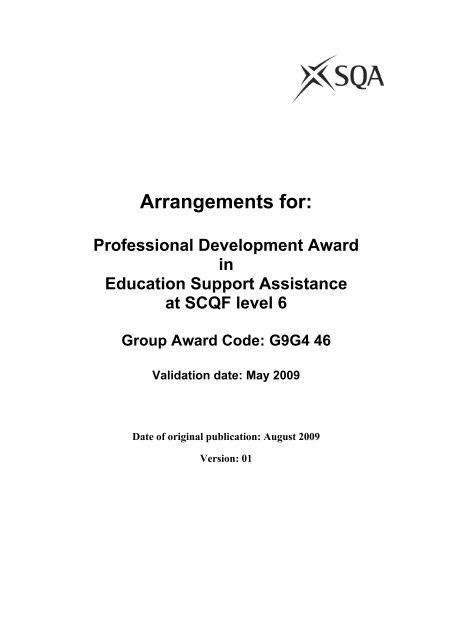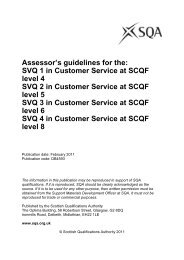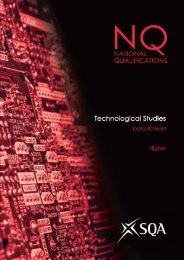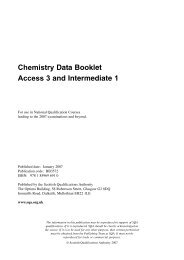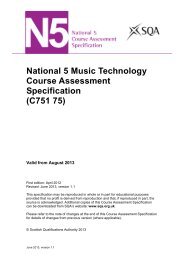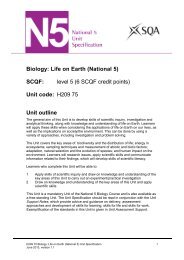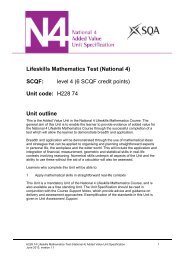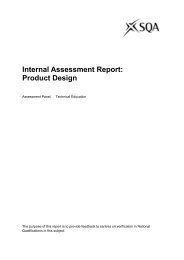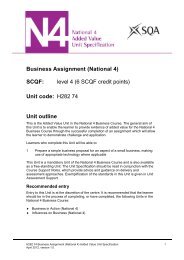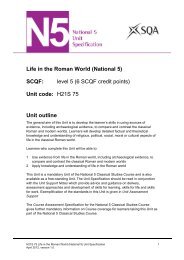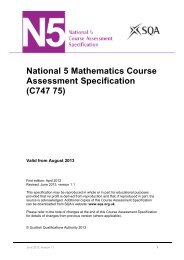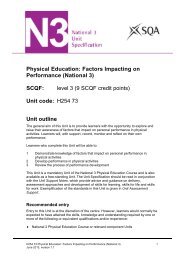Arrangements for: - Scottish Qualifications Authority
Arrangements for: - Scottish Qualifications Authority
Arrangements for: - Scottish Qualifications Authority
Create successful ePaper yourself
Turn your PDF publications into a flip-book with our unique Google optimized e-Paper software.
<strong>Arrangements</strong> <strong>for</strong>:<br />
Professional Development Award<br />
in<br />
Education Support Assistance<br />
at SCQF level 6<br />
Group Award Code: G9G4 46<br />
Validation date: May 2009<br />
Date of original publication: August 2009<br />
Version: 01
Acknowledgement<br />
SQA acknowledges the valuable contribution that Scotland’s colleges have made to the<br />
development of Professional Development Awards.
History of changes<br />
It is anticipated that changes will take place during the life of the qualification, and this<br />
section will record these changes. This document is the latest version and incorporates the<br />
changes summarised below.<br />
Version<br />
number<br />
Description Date Authorised by
Contents<br />
1 Introduction....................................................................................................................... 1<br />
2 Rationale <strong>for</strong> the revision of the Group Award ................................................................ 1<br />
3 Aims of the Group Award ................................................................................................ 1<br />
3.1 General aims of the Group Award................................................................................. 1<br />
3.2 Specific aims of the Group Award ................................................................................ 2<br />
3.3 Target groups................................................................................................................. 2<br />
3.4 Employment opportunities ............................................................................................ 2<br />
4 Access to Group Award.................................................................................................... 2<br />
5 Group Award structure ..................................................................................................... 2<br />
5.1 Framework..................................................................................................................... 3<br />
5.2 Mapping in<strong>for</strong>mation..................................................................................................... 4<br />
5.3 Articulation, professional recognition and credit transfer ............................................. 6<br />
6 Approaches to delivery and assessment............................................................................ 7<br />
7 General in<strong>for</strong>mation <strong>for</strong> centres........................................................................................ 8<br />
8 General in<strong>for</strong>mation <strong>for</strong> candidates .................................................................................. 9<br />
9 Glossary of terms............................................................................................................ 10<br />
10 Appendices ..................................................................................................................... 10<br />
Appendix 1: Suggested Delivery Schedule ............................................................................. 11
1 Introduction<br />
This is the <strong>Arrangements</strong> Document <strong>for</strong> the revised Group Award in Education<br />
Support Assistance (SCQF level 6) which was validated in May 2009. This<br />
document includes: background in<strong>for</strong>mation on the development of the Group<br />
Award, its aims, guidance on access, details of the Group Award structure, and<br />
guidance on delivery.<br />
This is a revised award, replacing the PDA <strong>for</strong> Classroom Assistants (CA) and the<br />
PDA <strong>for</strong> Support <strong>for</strong> Learning Assistants (SLA).<br />
The purpose of this PDA is to enable candidates to prepare themselves to undertake<br />
roles which support children and young people in an educational setting and will<br />
provide a plat<strong>for</strong>m to those already working in educational support roles <strong>for</strong><br />
Continuous Professional Development.<br />
2 Rationale <strong>for</strong> the revision of the Group Award<br />
The two existing PDAs, Classroom Assistants and Support <strong>for</strong> Learning Assistants,<br />
were nearing the end of their validity periods. There was a requirement to review,<br />
revise or rewrite their component Units in the light of:<br />
♦ the need to raise the profile of the job role of Education Support Assistants<br />
♦ the need to raise the standard of practice among those who support children and<br />
young people in an educational setting<br />
♦ new legislation<br />
♦ curriculum developments<br />
♦ the evolved changes to the roles and responsibilities of those who support<br />
children and young people in educational settings<br />
The purpose of the award is to ensure the highest possible level of competence and<br />
qualifications of those who carry out this valuable and crucial support role in<br />
educational settings. It also provides access to a qualification both at entry level and<br />
<strong>for</strong> Continuous Professional Development of Education Support Assistants.<br />
3 Aims of the Group Award<br />
3.1 General aims of the Group Award<br />
The general aims of the PDA are:<br />
1 To progress and develop personally and professionally either be<strong>for</strong>e or whilst<br />
in employment as an Education Support Assistant.<br />
2 To enable progression within the SCQF levels.<br />
3 To develop Core Skills.<br />
4 To develop study and research skills.<br />
5 To open up career opportunities within the education sector and to prepare<br />
candidates <strong>for</strong> further studies.<br />
<strong>Arrangements</strong> Document: PDA in Education Support Assistance at SCQF level 6 (G9G4 46) 1
3.2 Specific aims of the Group Award<br />
1 To enable candidates to develop the specific skills of an Education Support<br />
Assistant.<br />
2 To enable candidates to develop specific knowledge of issues associated with<br />
children and young people in educational settings.<br />
3 To provide candidates with opportunities to gain a deeper knowledge of<br />
Additional Support Needs across a broad spectrum of specific needs and<br />
disabilities.<br />
4 To develop personal effectiveness in a variety of educational settings.<br />
5 To prepare candidates <strong>for</strong> employment in a variety of education settings.<br />
3.3 Target groups<br />
♦ Candidates who wish to embark on a career as an Education Support Assistant<br />
♦ Candidates who are employed as Education Support Assistants (the job title<br />
may vary from one Local <strong>Authority</strong> area to another)<br />
♦ Candidates who wish to begin a learning journey in education by using the<br />
Units of this award as the building blocks to other qualifications<br />
3.4 Employment opportunities<br />
Attainment of this award may lead to employment opportunities <strong>for</strong> those not<br />
already in employment as Education Support Assistants.<br />
4 Access to Group Award<br />
Access is at the discretion of the centre and there are no artificial barriers to entry.<br />
Additional Support Needs of applicants will be taken into account during entry<br />
processes and may be discussed directly with the applicant should an entry<br />
interview <strong>for</strong>m part of such processes.<br />
A particular feature of the award is the requirement <strong>for</strong> candidates to be either<br />
employed or to have a period of workplace practice experience in an educational<br />
setting to enable them to meet the requirements of Units related to supporting<br />
children and young people in an educational setting and to develop their practice in<br />
an educational setting.<br />
In line with current legislation, Protection of Vulnerable Groups (Scotland) Act<br />
2007, candidates undertaking this PDA will require to be Disclosure Checked. It is<br />
important that centres explain this, and its implications, to applicants prior to entry.<br />
5 Group Award structure<br />
To attain the award of PDA in Education Support Assistance at SCQF level 6 a<br />
candidate must achieve 8 credits (48 SCQF credit points) consisting of all<br />
mandatory Units totalling 6 credits (36 SCQF credit points) and Optional Units<br />
worth 2 credits (12 SCQF credit points).<br />
<strong>Arrangements</strong> Document: PDA in Education Support Assistance at SCQF level 6 (G9G4 46) 2
5.1 Framework<br />
Mandatory Units – total of 6 credits<br />
Unit title Code SCQF<br />
credit<br />
points<br />
Supporting the Development of Children and<br />
Young People from Birth to Eighteen Years<br />
Supporting the Behaviour of Children and<br />
Young People<br />
Supporting Children and Young People in an<br />
Educational Setting<br />
Supporting Children and Young People who<br />
require Additional Support <strong>for</strong> Learning<br />
Professional Practice in an Educational<br />
Setting<br />
SCQF<br />
level<br />
SQA<br />
credit<br />
value<br />
F7HR 12 6 6 1<br />
F7HS 12 6 6 1<br />
F7HY 12 12 6 2<br />
F7HT 12 6 6 1<br />
F7HV 12 6 6 1<br />
Optional Units – total of 2 credits<br />
Unit title Code SCQF<br />
credit<br />
points<br />
The Rights and Entitlements of Children and<br />
Young People<br />
Supporting In<strong>for</strong>mation Communication<br />
Technology (ICT) in an Educational Setting<br />
Working with Children and Young People<br />
with Visual Impairments<br />
Working with Children and Young People<br />
with Autism<br />
Working with Physically Disabled Children<br />
and Young People<br />
Working with Children and Young People<br />
with Hearing Loss<br />
SCQF<br />
level<br />
SQA<br />
credit<br />
value<br />
F7HW 12 6 6 1<br />
F7HX 12 6 6 1<br />
F7J0 12 6 6 1<br />
F7J1 12 6 6 1<br />
F7J2 12 6 6 1<br />
F7J3 12 6 6 1<br />
Play in Early Education and Childcare DM41 12 6 6 1<br />
Supporting Language, Literacy and<br />
F7J4 12 6 6 1<br />
Numeracy in an Educational Setting<br />
First Aid F19M 11 6 5 1<br />
In<strong>for</strong>mation and Communication Technology F3GC 11 6 5 1<br />
<strong>Arrangements</strong> Document: PDA in Education Support Assistance at SCQF level 6 (G9G4 46) 3
5.2 Mapping in<strong>for</strong>mation<br />
Group Award title: PDA Education Support Assistance<br />
Communication Numeracy In<strong>for</strong>mation<br />
Technology<br />
Unit No Unit Name Oral Written Using<br />
Graphical<br />
In<strong>for</strong>mation<br />
F7HR 12 Supporting the<br />
Development of<br />
Children and Young<br />
People from Birth to<br />
Eighteen Years<br />
F7HS 12 Supporting the<br />
Behaviour of Children<br />
and Young People<br />
F7HY 12 Supporting Children and<br />
Young People in an<br />
Educational Setting<br />
F7HT 12 Supporting Children and<br />
Young People who<br />
require Additional<br />
Support <strong>for</strong> Learning<br />
F7HV 12 Professional Practice in<br />
an Educational Setting<br />
F7HW 12 The Rights and<br />
Entitlements of Children<br />
and Young People<br />
F7HX 12 Supporting In<strong>for</strong>mation<br />
Communication<br />
Technology (ICT) in an<br />
Educational Setting<br />
Using<br />
Number<br />
Using IT<br />
Critical<br />
Thinking<br />
Problem Solving<br />
Planning<br />
and<br />
Organising<br />
<br />
<br />
Reviewing<br />
and<br />
Evaluating<br />
<br />
<br />
<br />
<br />
<br />
Working<br />
with<br />
Others<br />
WWO<br />
<strong>Arrangements</strong> Document: PDA in Education Support Assistance at SCQF level 6 (G9G4 46) 4
Communication Numeracy In<strong>for</strong>mation<br />
Technology<br />
Unit No Unit Name Oral Written Using<br />
Graphical<br />
In<strong>for</strong>mation<br />
F7J0 12 Working with Children<br />
and Young People with<br />
Visual Impairments<br />
F7J1 12 Working with Children<br />
and Young People with<br />
Autism<br />
F7J2 12 Working with<br />
Physically Disabled<br />
Children and Young<br />
People<br />
F7J3 12 Working with Children<br />
and Young People with<br />
Hearing Loss<br />
DM41 12 Play in Early Education<br />
and Childcare<br />
F7J4 12 Supporting Language,<br />
Literacy and Numeracy<br />
in an Early Education<br />
and Childcare Setting<br />
Using<br />
Number<br />
Using IT<br />
Critical<br />
Thinking<br />
Problem Solving<br />
Planning<br />
and<br />
Organising<br />
Reviewing<br />
and<br />
Evaluating<br />
<br />
<br />
<br />
<br />
<br />
<br />
F19M 11 First Aid <br />
F3GC 11 In<strong>for</strong>mation and<br />
Communication<br />
Technology<br />
<br />
indicates where Core Skill component might be developed.<br />
Working<br />
with<br />
Others<br />
WWO<br />
<strong>Arrangements</strong> Document: PDA in Education Support Assistance at SCQF level 6 (G9G4 46) 5
5.3 Articulation, professional recognition and credit transfer<br />
There is at present no direct articulation, professional recognition or credit transfer<br />
relating to this PDA.<br />
It is envisaged that this award will articulate with others in the area of childhood<br />
studies or childhood practice.<br />
Candidates successfully completing the award may be eligible to apply <strong>for</strong> entry to<br />
awards such as HNC Early Years Care and Development or, if in employment, they<br />
may be considered <strong>for</strong> entry to SVQ level 3 <strong>for</strong> Classroom Assistants.<br />
<strong>Arrangements</strong> Document: PDA in Education Support Assistance at SCQF level 6 (G9G4 46) 6
6 Approaches to delivery and assessment<br />
Content and context<br />
Mode of delivery<br />
The PDA in Education Support Assistance can be delivered on a full time or a part<br />
time basis. It would also be possible <strong>for</strong> candidates to build the award by achieving one<br />
Unit at a time.<br />
Sequence of delivery<br />
Centres may devise their own timetable <strong>for</strong> the delivery of the award but there is a<br />
sample sequence in Appendix 1 that could be adopted <strong>for</strong> either full or part time<br />
candidates.<br />
Delivery methods<br />
An abundance of delivery methods could be adopted throughout the delivery of this<br />
award. These might include:<br />
♦ Formal lectures <strong>for</strong> theory parts of the Units<br />
♦ Role play activities<br />
♦ Use of ICT <strong>for</strong> self study sessions<br />
♦ Class discussion following work placement to analyse and evaluate own<br />
per<strong>for</strong>mance and to discuss client behaviour/progress<br />
♦ The use of approved video film to demonstrate child behaviour<br />
Work placement requirements<br />
Please refer to the Access section <strong>for</strong> legislative requirements.<br />
Work placement venues will need to be approved and agreed between the centre, the<br />
candidate and the workplace setting’s management. Compliance with Health and<br />
Safety regulations and Risk Assessment are paramount.<br />
Candidates already in relevant employment may be able to attain the work placement<br />
elements within their own place of work. Where this is not the case, or where only part<br />
of these requirements can be met, then a work placement will need to be secured.<br />
Assessment strategy<br />
Whilst centres are duty bound to abide by the mandatory requirements of the<br />
component Units, it is essential to minimise assessment load on candidates and it is<br />
recommended that a holistic approach to assessment be taken wherever possible.<br />
The following strategies are recommended:<br />
♦ Use of IT to construct reports, presentations, graphs etc <strong>for</strong> most of the Units could<br />
contribute to the ICT components of the mandatory Unit and the In<strong>for</strong>mation and<br />
Communication Technology Unit if selected<br />
<strong>Arrangements</strong> Document: PDA in Education Support Assistance at SCQF level 6 (G9G4 46) 7
♦ Cross assessment opportunities eg with specialist Units, where candidates are<br />
required to undertake an investigation into aspects of working with children and<br />
young people with specific Additional Support Needs<br />
♦ An integrated approach to teaching and delivery of Units to minimise attendance at<br />
classes and to reduce the incidence of repetition<br />
♦ Use of a Virtual Learning Environment <strong>for</strong> posting lecture notes, interactive<br />
discussions among learners and between learners and tutors etc<br />
Integration opportunities<br />
Where possible, opportunities should be created <strong>for</strong> integration of teaching, learning<br />
and assessment<br />
Re-assessment<br />
Where candidates have been unsuccessful in demonstrating their attainment, they can<br />
be re-assessed. Unless a specific Unit states otherwise standard SQA advice is that<br />
there should normally be one, or in exceptional circumstances two, re-assessment<br />
opportunities. Further guidance can be found in the SQA publication, Guide to<br />
Assessment AA4147, June 2008.<br />
Guidance on Open Learning<br />
Full details on the suitability of individual Units <strong>for</strong> Open Learning are contained in<br />
each individual Unit specification. Aspects of many Units could be delivered on an<br />
Open Learning basis but special arrangements would be required to ensure that any<br />
assessments were the candidate’s own work.<br />
7 General in<strong>for</strong>mation <strong>for</strong> centres<br />
Disabled candidates and/or those with additional support needs<br />
The additional support needs of individual candidates should be taken into account<br />
when planning learning experiences, selecting assessment instruments, or considering<br />
whether any reasonable adjustments may be required. Further advice can be found on<br />
our website www.sqa.org.uk/assessmentarrangements.<br />
Internal and external verification<br />
All instruments of assessment used within this Group Award should be internally<br />
verified, using the appropriate policy within the centre and the guidelines set by SQA.<br />
External verification will be carried out by SQA to ensure that internal assessment is<br />
within the national guidelines <strong>for</strong> these qualifications.<br />
Further in<strong>for</strong>mation on internal and external verification can be found in SQA’s Guide<br />
to Assessment and Quality Assurance <strong>for</strong> Colleges of Further Education<br />
(www.sqa.org.uk).<br />
<strong>Arrangements</strong> Document: PDA in Education Support Assistance at SCQF level 6 (G9G4 46) 8
8 General in<strong>for</strong>mation <strong>for</strong> candidates<br />
The aim of this award is to give you the opportunity to gain a worthwhile, recognised<br />
qualification which gives you the knowledge and skills you require to be an effective<br />
Education Support Assistant.<br />
Whether you are already employed working with children and young people, or you<br />
have always wanted to support children and young people in an educational setting,<br />
this award will prepare you <strong>for</strong> the tasks ahead and will allow you to:<br />
♦ gain new knowledge or deepen the knowledge you already have<br />
♦ build on skills you already have, and learn new skills<br />
♦ gain an understanding of how children and young people learn and develop<br />
To attain the award, PDA in Education Support Assistance at SCQF level 6, you will<br />
need to attain a total of 8 credits (48 SCQF credit points). There are 5 mandatory Units<br />
giving 6 credits (36 SCQF credit points) which will give you specific knowledge:<br />
♦ The development of children and young people from birth to 18<br />
♦ Supporting the behaviour of children and young people<br />
♦ Providing support to children and young people in school<br />
♦ Supporting children and young people with Additional Support Needs<br />
♦ Knowledge and understanding about what ‘professional practice’ means<br />
In consultation with your course lecturer you will select 2 optional Units giving 2<br />
credits (12 SCQF credit points) from a list of 10 Units. Specific knowledge from these<br />
can be:<br />
♦ Knowledge about the rights and entitlements of children and young people<br />
♦ How In<strong>for</strong>mation and Communication Technology is used in schools<br />
♦ Working with children and young people with autism<br />
♦ Working with children and young people with visual impairments<br />
♦ Working with children and young people with hearing loss<br />
♦ Working with physically disabled children and young people<br />
♦ The importance of Play and active learning in the learning and development of<br />
children and young people<br />
♦ First Aid<br />
♦ In<strong>for</strong>mation Technology<br />
<strong>Arrangements</strong> Document: PDA in Education Support Assistance at SCQF level 6 (G9G4 46) 9
9 Glossary of terms<br />
SCQF: This stands <strong>for</strong> the <strong>Scottish</strong> Credit and Qualification Framework, which is a<br />
new way of speaking about qualifications and how they inter-relate. We use SCQF<br />
terminology throughout this guide to refer to credits and levels. For further in<strong>for</strong>mation<br />
on the SCQF visit the SCQF website at www.scqf.org.uk<br />
SCQF credit points: One HN credit is equivalent to 8 SCQF credit points. This<br />
applies to all HN Units, irrespective of their level.<br />
SCQF levels: The SCQF covers 12 levels of learning. HN Units will normally be at<br />
levels 6–9. Graded Units will be at level 7 and 8.<br />
Subject Unit: Subject Units contain vocational/subject content and are designed to test<br />
a specific set of knowledge and skills.<br />
Graded Unit: Graded Units assess candidates’ability to integrate what they have<br />
learned while working towards the Units of the Group Award. Their purpose is to add<br />
value to the Group Award, making it more than the sum of its parts, and to encourage<br />
candidates to retain and adapt their skills and knowledge.<br />
Dedicated Unit to cover Core Skills: This is a non-subject Unit that is written to<br />
cover one or more particular Core Skills.<br />
Embedded Core Skills: This is where the development of a Core Skill is incorporated<br />
into the Unit and where the Unit assessment also covers the requirements of Core Skill<br />
assessment at a particular level.<br />
Signposted Core Skills: This refers to the opportunities to develop a particular Core<br />
Skill at a specified level that lie out-with automatic certification.<br />
Qualification Design Team: The QDT works in conjunction with a Qualification<br />
Manager/Development Manager to steer the development of the HNC/HND from its<br />
inception/revision through to validation. The group is made up of key stakeholders<br />
representing the interests of centres, employers, universities and other relevant<br />
organisations.<br />
Consortium-devised HNCs and HNDs are those developments or revisions<br />
undertaken by a group of centres in partnership with SQA.<br />
Specialist single centre and specialist collaborative devised HNCs and HNDs are<br />
those developments or revisions led by a single centre or small group of centres who<br />
provide knowledge and skills in a specialist area. Like consortium-devised HNCs and<br />
HNDs, these developments or revisions will also be supported by SQA.<br />
10 Appendices<br />
Appendix 1: Sample Sequence of Delivery<br />
<strong>Arrangements</strong> Document: PDA in Education Support Assistance at SCQF level 6 (G9G4 46) 10
Appendix 1: Suggested Delivery Schedule<br />
Group Award title: PDA Education Support Assistance<br />
Unit No Unit Title Level Mandatory(M)<br />
/Optional(O)<br />
Credit<br />
Value<br />
Block I/<br />
Semester I<br />
Block II/<br />
Semester II<br />
F7HR 12 Supporting the Development of Children and<br />
6 Mandatory 1 <br />
Young People from Birth to Eighteen Years<br />
F7HS 12 Supporting the Behaviour of Children and Young 6 Mandatory 1 <br />
People<br />
F7HY 12 Supporting Children and Young People in an<br />
6 Mandatory 2 <br />
Educational Setting<br />
F7HT 12 Supporting Children and Young People who<br />
6 Mandatory 1 <br />
require Additional Support <strong>for</strong> Learning<br />
F7HV 12 Professional Practice in an Educational Setting 6 Mandatory 1 <br />
Block III<br />
F7HW 12 The Rights and Entitlements of Children and<br />
Young People<br />
6<br />
F7HX 12 Supporting In<strong>for</strong>mation Communication<br />
Technology (ICT) in an Educational Setting<br />
6<br />
F7J0 12 Working with Children and Young People with<br />
Visual Impairments<br />
6<br />
F7J1 12 Working with Children and Young People with<br />
Autism<br />
6<br />
F7J3 12 Working with Children and Young People with<br />
Hearing Loss<br />
6<br />
F7J2 12 Working with Physically Disabled Children and<br />
Young People<br />
6<br />
DM41 12 Play in Early Education and Childcare 6<br />
F7J4 12 Supporting Language, Literacy and Numeracy in<br />
an Educational Setting<br />
6<br />
F19M 11 First Aid 6<br />
F3GC 11 In<strong>for</strong>mation and Communication Technology 6<br />
Optional 1 <br />
Optional 1 <br />
Optional 1 <br />
Optional 1 <br />
Optional 1 <br />
Optional 1 <br />
Optional 1 <br />
Optional 1 <br />
Optional 1 <br />
Optional 1 <br />
<strong>Arrangements</strong> Document: PDA in Education Support Assistance at SCQF level 6 (G9G4 46) 11


